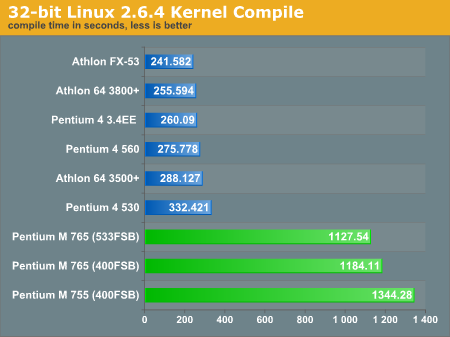Linux and the Desktop Pentium M: Uncommon Performance
by Kristopher Kubicki on December 24, 2004 12:00 PM EST- Posted in
- Linux
Compiling Benchmarks
We get a lot of requests to show some compiling benchmarks. We took the standard Linux 2.6.4 release from kernel.org and compiled it under our 32-bit test bed. We did not cross platform compile for simplicity, so we are only looking at the 32-bit vanilla kernel. We used the commands as below.# yes "" | make config
# time make

Here, we see the largest deficiency of the Dothan yet.
The fact that the processor also utilizes much slower DDR333 probably does not help either, and we will have a chance to revisit that theory before the end of the benchmarks. With a moderate amount of overclocking via "scaling_setspeed", we were able to squeeze much better performance out of the chip - and we are still using the 40mm fan!
Update: We found an inconsitency after several days of trials in our test setup. It seems as though the PATA controller on our DFI motherboard is behaving irregularly. We believe this is localized to only this motherboard, but the controller is not behaving properly, and limiting our transfer rates. The GCC compile test is the only test in our benchmark that is HD bottlenecked.










47 Comments
View All Comments
Lynx516 - Monday, December 27, 2004 - link
What yozza says is true gcc 3.4.1 is old especially a pre release. As yozza said it has some bugs in it with respect to the pentiu_m march flag.I have been running gcc 3.4.3 for atleast 2 months and i definatly was not one of the first to use itKristopherKubicki - Monday, December 27, 2004 - link
Yozza: I made some corrections. Saying GCC 3.4.1 is "pretty old" seems pretty hard for me to swallow, but the rest of what you say seems correct. I would be interested in seeing your P-M compile time benchmarks.Kristopher
Yozza - Sunday, December 26, 2004 - link
The march=pentium-m flag was pretty broken on earlier gcc 3.4 releases, and it seems that you're using quite an early "3.4.1 (prerelease)" version, which could explain a few things, especially your TSCP benchmarks, where the Pentium-M is the only one to have its performance _decrease_ with optimised (march=pentium-m) compiler flags. This clearly indicates some issues with pentium-m optimisations in your gcc revision (3.4.1 is pretty old these days).The extremely slow kernel compile time is especially surprising though. I did some test just now on my 1.7GHz Banias P-M, and the kernel compile times do NOT appear to correspond with your results. So I guess something seems amiss with your system configuration.
There was certainly some pretty impressive performance in the integer-dependent tests such as the database one -- we already know that the P-M's fp performance isn't that great, which explains some of the more fp-dependent benchmark results. I for one was pretty impressed by its performance in the majority of the benchmarks and by its scaling possibilities, both wrt FSB/memory and core freqs. If only Intel would upgrade the platform to 800MHz FSB with dual channel DDR400; such a configuration would be appear to hold a lot of promise.
The argument that "Dothan is adherently a linear processor" doesn't hold water either (it should be "inherently" too), since the kernel compile uses one thread by default. Regardless, it should have been possible to test different CPU schedulers to determine how well Dothan deals with multi-tasking loads, particularly wrt compile times by comparing different "MAKEOPTS=-jX" settings. Behaviour under such loads is as dependent on the CPU scheduler as it is on the CPU itself anyway.
Hence, clearly, the comment "When we stack multiple jobs on the processing queue, Dothan spends a huge majority of its time swapping around" is flawed and incorrect. The implication that the CPU 'swaps around' somewhat like memory paging to disk is rather inaccurate to say the least.
larson0699 - Sunday, December 26, 2004 - link
"...The only additional offering that the 855GME feature provides is a 64-bit PCI-X (not to be confused with PCI-Express) bus..."PCI-X is a "feature" of the 6300ESB ("Hance Rapids") southbridge, NOT the 855GME northbridge.
Other makers used the standard ICH5 southbridge, hence no PCI-X slots.
Such a system would be awesome for a mini RAID server. An adapter from 3Ware would be the perfect utilization of the PCI-X slot provided. Ahh...
vaystrem - Sunday, December 26, 2004 - link
Why not Gentoo?You could do two boxes - compile the entire OS optomized for the Pentium M with latest GCC revision and do the exact same for the Athlon 64 Box.
That would be a lot more interesting comparison and useful than doing these benchmarks on top of Suse whose default optomizations are certainly hurting the PentiumM.
bhtooefr - Saturday, December 25, 2004 - link
BTW, I mean that maybe Intel shut them down...bhtooefr - Saturday, December 25, 2004 - link
Hmm... maybe you're right... After all, it seemed that PowerLeap was dodging my questions about their P-M adaptor (and then tried to pimp the PL-AXP (basically a golden fingers card for Socket A) - if I wanted to unlock an AXP, I'd get a pencil ;-))...Here's the chat: http://cpu-museum.de/forum/download.php?id=334
sprockkets - Saturday, December 25, 2004 - link
Oh well, I just looked at SuSE 9.1 again and 9.2 has the ability with kpowersave to select easily the profiles it will use to run, and will say what processor speed it currently is throttling to.ElFenix - Saturday, December 25, 2004 - link
i'd like to point out that 'heat sink' is actually two words. thanks.KristopherKubicki - Saturday, December 25, 2004 - link
bhtooefr: I am pretty sure intel wont let them do that.Kristopher